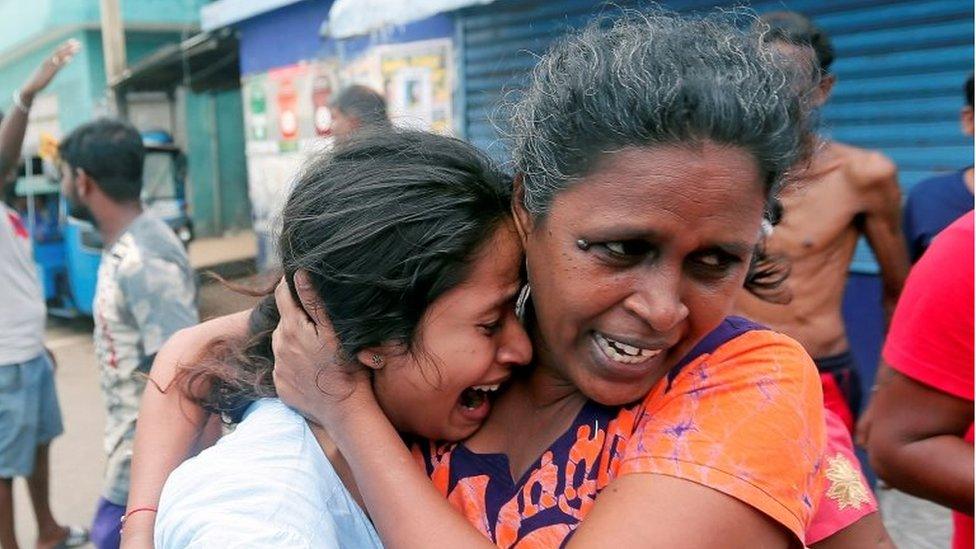Sri Lanka bombings: 15 die in blast during raid on suspected hideout
- Published
Brother Stanley recalls coming face-to-face with one of the Sri Lanka bombing suspects
Fifteen people including six children were killed in Sri Lanka on Friday when suspected Islamist militants blew themselves up in a raid, police said.
The raid occurred in Sainthamaruthu, near the hometown of the suspected ringleader of the Easter Sunday attacks that killed at least 250 people.
Gunmen opened fire as troops attempted to raid a house, police said.
Three men set off explosives, they added, killing the children and three women. Three others died in gunfire.
One civilian was caught in the crossfire and died, according to police, while a wounded woman and child were taken to hospital.
Footage shown on state television showed charred bodies inside the house, one cradling a rifle. Explosives, a generator, a drone, and batteries were also visible.
Around the same time, security forces raided another building in a nearby town where they said they found explosives and a drone.
Some 600 Muslims fled the area as the raid unfolded and took shelter in a school, residents said.

An eerie silence
By Anbarasan Ethirajan, BBC News, Sainthamaruthu
There's an eerie silence in the street where security forces carried out the raid. Three armed policemen stand outside the house, which has suffered damage to its roof. Steel gates and glass windows have been shattered. There are bloodstains on the ground.
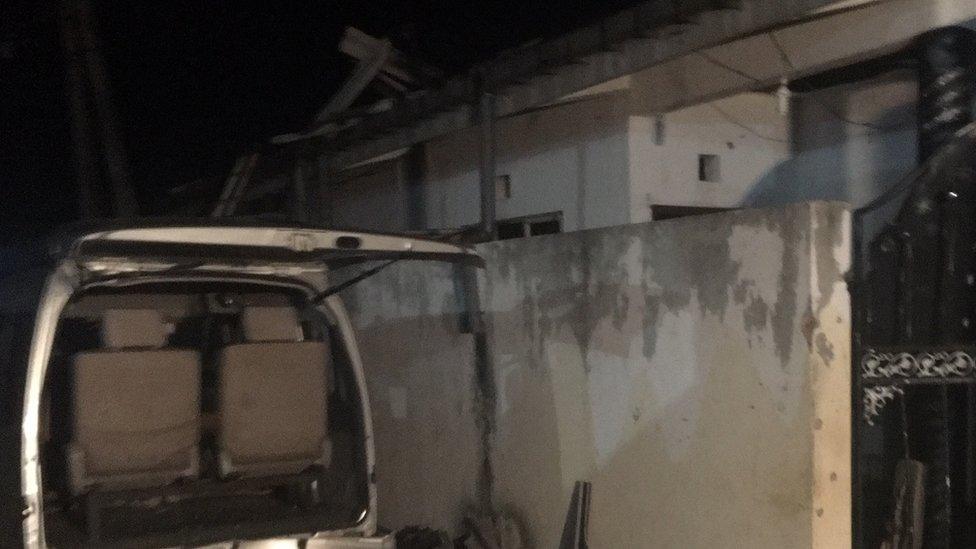
A van damaged during the shooting is still there. There were suspicions that the van could have been booby-trapped but police have not found anything inside the van so far. Police found charred remains of several people inside the building.
All the neighbours in the street have moved out of the area because of fears for their safety. Police say a woman and a child were rescued from the house. Both of them were injured. They believe they could be the wife and daughter of radical cleric Zahran Hashim, the suspected mastermind of the Easter Sunday attacks.
Sainthamaruthu is a predominantly Muslim town overlooking the Indian Ocean. It is about 360km (240 miles) from the capital, Colombo. Residents here are still in disbelief that hardcore militants were hiding in a middle-class locality. It is still not clear how many suspected Islamists are still in hiding.

Sri Lanka has been on high alert since a co-ordinated wave of bombings last Sunday, which also wounded more than 500 people.
The bombings targeted churches that were packed full for the Easter holiday, as well as hotels popular with tourists.
Sri Lankan authorities blamed a local Islamist extremist group, National Tawheed Jamath, for the attacks, although the Islamic State group (IS) has also claimed it played a role.
President Maithripala Sirisena outlawed the extremists under new emergency laws, as well as the militant group Jamathei Millathu - whose members are also thought to have been involved.
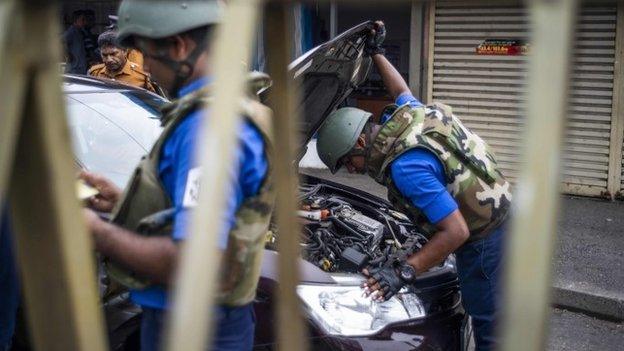
Sri Lankan soldiers inspect a car at a checkpoint in the capital, Colombo
Security forces have carried out raids across the country since the attacks, but officials say there are dozens of IS sympathisers still at large in the country.
Police said the raid on Friday followed a tip-off about a location in the Muslim-majority town of Ampara Sainthamaruthu, near Batticaloa.
The area is not far from the hometown of Zahran Hashim, who is said to have died in one of the bombings on Sunday.
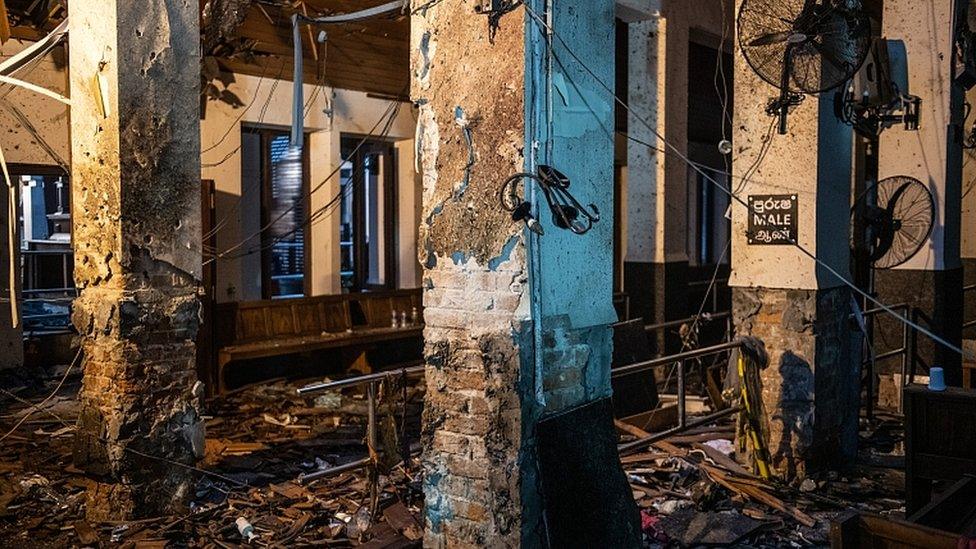
St Anthony's shrine in Colombo was one of the churches targeted by bombers
In another raid in the same town, IS flags, 150 sticks of gelignite explosive, thousands of steel pellets and a drone camera were found, a military spokesman said.
According to local media reports, 10 arrests were made across the country on Friday, bringing the total number detained since last Sunday to 80.
President Sirisena has told reporters that intelligence services believed about 130 suspects linked to IS were in the country and that police were hunting 70 still at large.
Bomber 'sat, ate, and waited'
The manager of one of the Colombo hotels targeted by a suicide bomber last Sunday described to the BBC the moments leading up to the attack.
Rohan Karr said the suspected bomber checked into the Cinnamon Grand hotel the evening before, was served a welcome drink and then went up to his room.
CCTV footage from the Cinnamon Grand breakfast room
"He came down in the morning with the rucksack on his back and he went into the restaurant. He made sure he got a table right in the middle of the restaurant and he was walking around with the rucksack on his back.
"We never thought this was the man who [was] going to kill us.
"He sat, he ate, he waited for people to gather towards the buffet. When he saw a bigger crowd that was the time he decided, this is the time for me to create maximum damage."
How has the Catholic Church responded?
The Catholic Church in Sri Lanka has cancelled all Sunday Masses until further notice. Archbishop of Colombo Malcolm Ranjith said he had seen a leaked security document warning of further attacks.
Cardinal Ranjith said that the Church had not been told about intelligence warnings of possible attacks. "We didn't know anything. It came as a thunderbolt for us," he told reporters.
Asked about the warnings, he said: "I felt betrayed a little bit. I felt sad. It's a very serious lapse on the part of the security agencies that they didn't tell us about it."
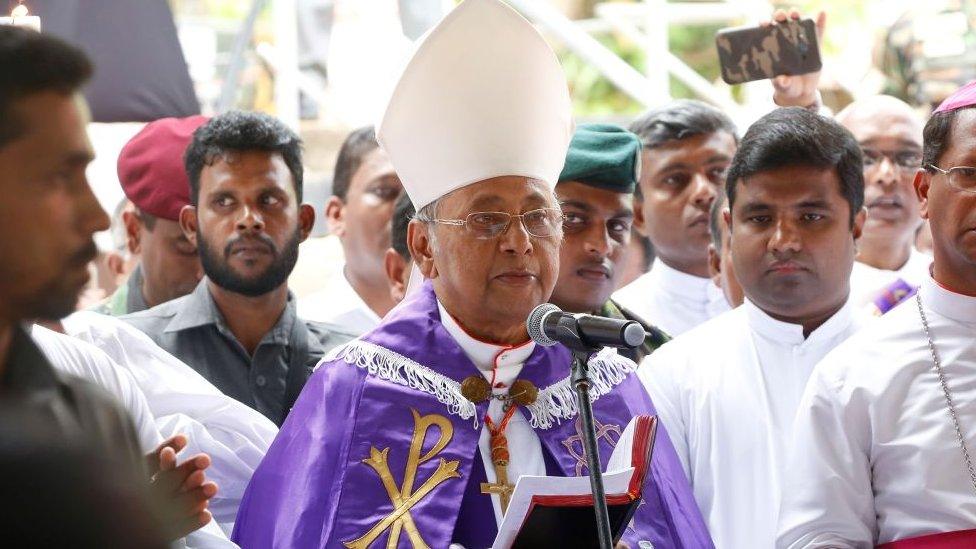
Cardinal Malcolm Ranjith, Archbishop of Colombo, fears further attacks are possible
He said the church would halt all services until further notice, and urged parishioners to instead "stay indoors and do their prayers".
Security was stepped up around mosques for Friday prayers, while some Muslims stayed away, fearing revenge attacks.
What is the political fallout?
Sri Lanka's police chief and top defence ministry official both resigned over the bombings.
But Sri Lanka's Prime Minister Ranil Wickremesinghe said that crucial intelligence warnings had not been passed on to him. He argued that as he had not been aware of the warnings, he did not need to step down from his position.
"If we had any inkling, and we had not taken action, I would have handed in my resignation immediately," he said, adding: "But what do you do when you are out of the loop?"
Ranil Wickremesinghe spoke to the BBC
The breakdown in communication has refocused attention on the infighting between the country's two most powerful men - Mr Wickremesinghe and President Maithripala Sirisena.
Relations between the two deteriorated to such an extent that last October, Mr Sirisena sacked Mr Wickremesinghe. He was reinstated in December following rulings by Sri Lanka's highest courts.
Who were the attackers?
Zahran Hashim's sister condemns his actions
Nine people are suspected of carrying out the attacks. President Sirisena confirmed that the alleged ringleader, Zahran Hashim, died in the attack at the Shangri-La hotel in the capital, Colombo.
Two of the bombers are said to have been the sons of spice trader Mohammad Yusuf Ibrahim, one of Sri Lanka's richest men. Mr Ibrahim was detained and questioned after the attacks.
One of his sons was reportedly the second bomber at the Shangri-La hotel alongside Zahran Hashim. The other son reportedly targeted the restaurant at the high-end Cinnamon Grand hotel, a short distance away.
- Published25 April 2019
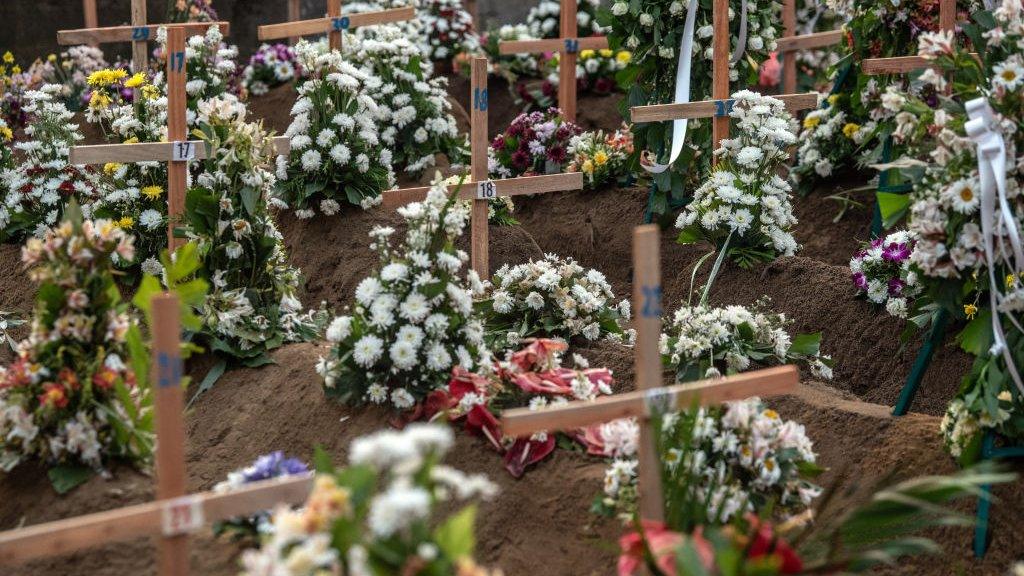
- Published26 April 2019
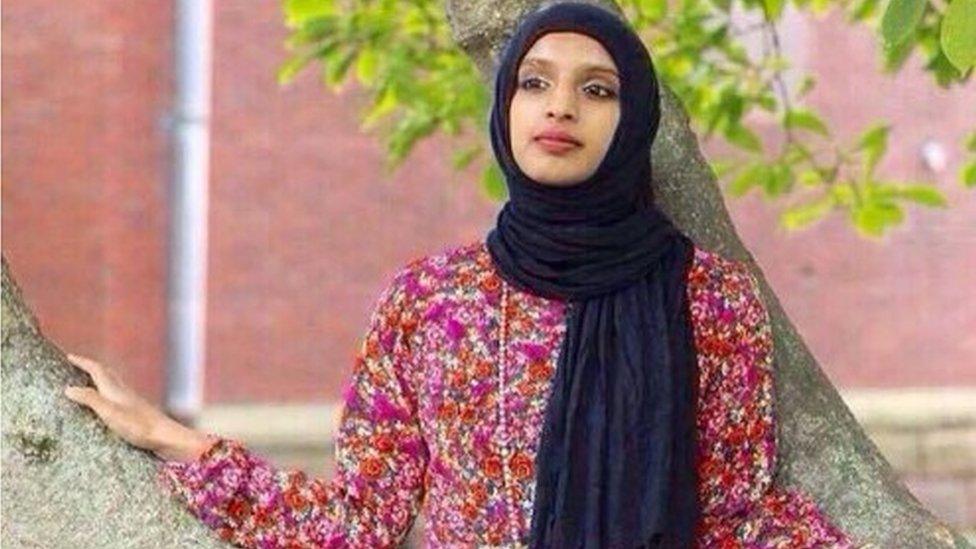
- Published26 April 2019
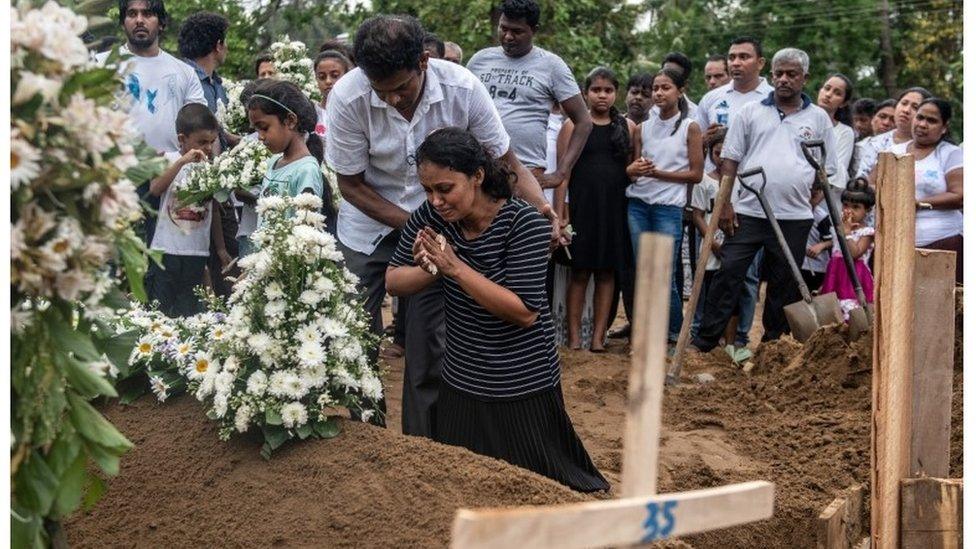
- Published23 April 2019
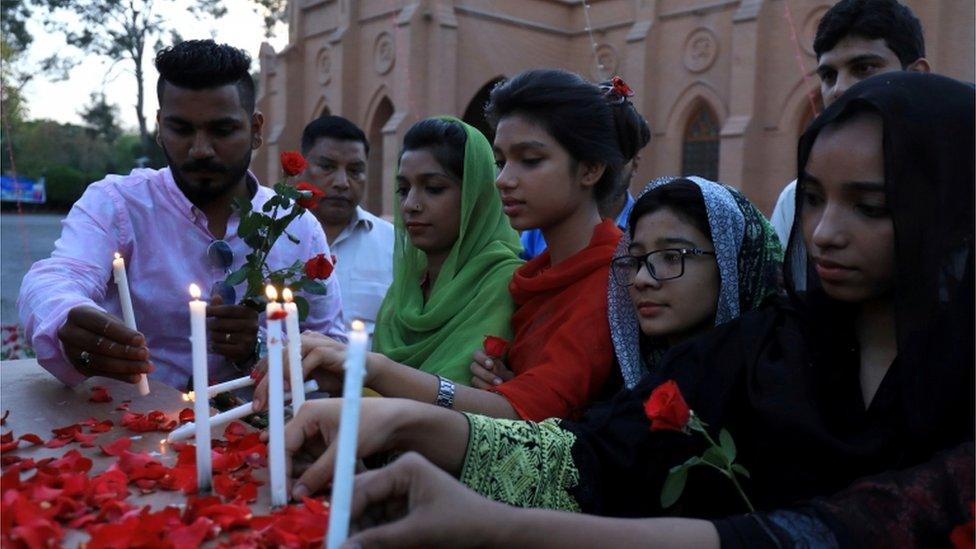
- Published28 April 2019
